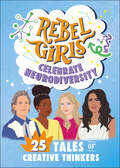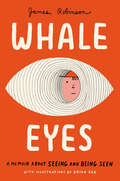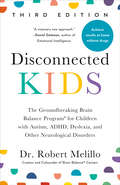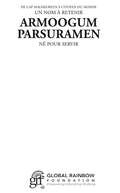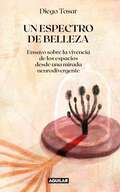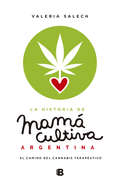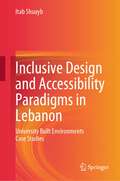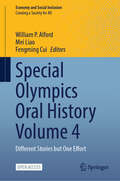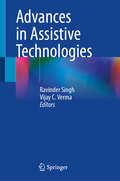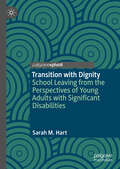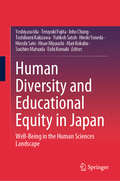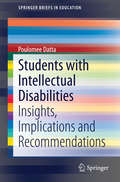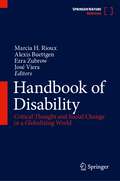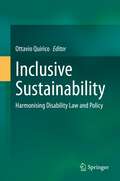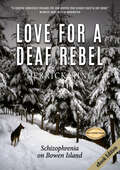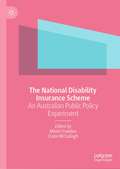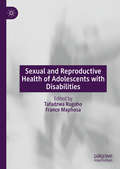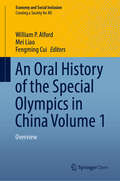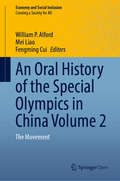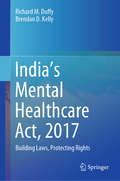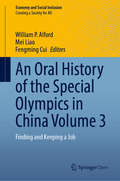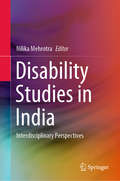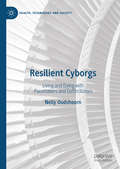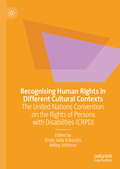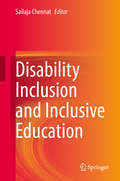- Table View
- List View
Rebel Girls Celebrate Neurodiversity: 25 Tales of Creative Thinkers (Rebel Girls Minis)
by Rebel GirlsTRUE STORIES OF NEURODIVERGENT ICONSThis collection features 25 inspiring tales of neurodivergent artists, athletes, innovators, and more. Read about how these women and girls thought creatively, achieved their dreams, and advocated for the rights of neurodivergent people everywhere.Walk the runway with Madeline Stuart, the first professional model with Down syndrome. Steal the scene with Salma Hayek, the award-winning actor with dyslexia. Learn how journalist and TV host Lisa Ling thrives with ADD, and how Temple Grandin’s autism has opened up new and compassionate ways of interacting with animals.This book pairs inspiring, easy-to-read text with colorful full-page portraits created by female and nonbinary artists from all around the world. Plus, scannable codes let you listen to longer stories on the Rebel Girls app!
Whale Eyes: A Memoir About Seeing and Being Seen
by James Robinson"This lively, interactive...heartfelt memoir is truly eye-opening and will encourage readers to seek out his other works."—Booklist, starred review An accessible and immersive account of growing up with strabismus, a condition of eye misalignment...Robinson presents a sincere reflection on childhood experiences of growing up in a world not built with him in mind."—Publishers Weekly, starred reviewFrom Emmy Award–winning documentary filmmaker James Robinson comes a breathtaking illustrated memoir for middle-grade readers (and adults, too)—inspired by the viral, Emmy-nominated short film Whale Eyes.Told through an experimental mix of intimate anecdotes and interactive visuals, this book immerses readers in James&’s point of view, allowing them to see the world through his disabling eye conditions.Readers will get lost as they chase words. They&’ll stare into this book while taking a vision test. They&’ll hold it upside down as they practice &“pretend-reading&”…and they&’ll follow an unlikely trail toward discovering the power of words. With poignant illustrations by Eisner Award–nominated artist Brian Rea, James&’s story equips readers of all ages with the tools to confront their discomfort with disability and turn confused, blank stares into powerful connections.
Disconnected Kids, Third Edition: The Groundbreaking Brain Balance Program for Children with Autism, ADHD, Dyslexia, and Other Neurological Disorders
by Dr. Robert MelilloA revised and updated edition of the proven, drug-free program to treat the cause—not just the symptoms—of autism spectrum disorders, ADHD, and related neurological conditionsDiagnosis rates of neurological disorders—including autism spectrum disorders, ADHD, dyslexia, and obsessive-compulsive disorders—are climbing at an alarming rate. Yet psychiatric drugs don&’t cure the problems; they only disguise the symptoms. Dr. Robert Melillo&’s pioneering work that began in the 1990s with the creation of his groundbreaking Brain Balance program has brought a new understanding to the cause of these conditions: an imbalance between the left and right sides of the child&’s developing brain. Today, more than fifty thousand children have successfully completed the Brain Balance program and have experienced dramatic improvements in behavioral, emotional, social, and academic outcomes.Disconnected Kids is a comprehensive at-home guide to the Brain Balance program, which involves no medication or medical interventions but focuses instead on movement and sensory exercises that stimulate proper brain development. This updated and revised edition also features new exercises and the latest research findings on how the retention of primitive reflexes—the involuntary movements babies are born with that typically are replaced with intentional movements by their first birthday—plays an integral role in the development of neurological issues. Through the exercises in this book, these reflexes can be diminished, making brain balance easier to attain. Disconnected Kids helps readers guide children susceptible to a brain imbalance to overcome challenges and allow their true gifted selves to shine.
I Rise 2021
by Global Rainbow FoundationA real ambassador, spiritually tuned with an indomitable faith in the Divine, Mr. Armoogum dedicates his life to uplift, empower and celebrate our ‘challenged’ people. His devotion to humanity is the pillar of the Global Rainbow Foundation. He embarked on the mission to rethink and reenact the real essence of service to Society and Humanity. His human militancy towards the human rights, visibility, equality, acceptance and employability of our physically disabled friends is escalated on an international platform along with Mauritius. GRF is re-charting the Voice of the PWDs, in a selfless attempt to demarginalize them. GRF is their amplified voice; they, no longer remain silenced and unheard. GRF is a blessed haven for the physically-abled persons who enjoy social integrity to its maximum.
Un espectro de belleza: Ensayo sobre la vivencia de los espacios desde una mirada neurodivergente
by Diego TosarDiego Tosar nos invita a ir en busca de aquello que nos une con las personas del espectro autista, más que de aquello que nos diferencia, para proponer otra posible arquitectura, una arquitectura repleta de sensibilidad para todos. Este libro es un intento por ampliar la mirada sobre la concepción de los espacios, los cuales no contemplan aún la diversidad que conforma nuestra sociedad. Diego Tosar lleva adelante un análisis reflexivo sobre las características de los entornos discapacitantes para las personas dentro del espectro autista. Propone así estrategias viables para modificar el sistema, en la búsqueda de garantizar un entorno que resulte más amable y que favorezca la convivencia. Una forma de interpretar el propósito de este ensayo es el de lograr una mejor comprensión sobre cómo percibe, cómo procesa y cómo se ve afectada la conducta de diferentes personas dentro del espectro autista, en relación a los estímulos que se le presentan en los ambientes. Por otra parte, este libro es también el ensayo de un padre, de profesión arquitecto, que desde el desconcierto intenta amorosamente comprender a su hijo. Esta vivencia personal se convierte en el motor que impulsa una reflexión personal y profesional ampliada y comprometida.
El libro de Mamá Cultiva Argentina
by Mamá Cultiva ArgentinaUn grupo de madres y pacientes unidos por una problemática común creó la ONG Mamá Cultiva Argentina y convenció a los legisladores de la importancia de acceder a medicamentos producidos en base a extractos de la planta de cannabis para aliviar dolencias crónicas y severas padecidas por numerosos niños, jóvenes, adultos y ancianos de nuestro país. Valeria Salech irradia con naturalidad las virtudes ocultas en el significado de su nombre. De casualidad conocí su valor y valentía en 2017, pocos días antes de la sanción de la Ley 27350 de cannabis medicinal, en una gesta cívica librada por un pequeño colectivo de mujeres que reclamaron y convencieron a legisladores de ambas cámaras de que los prejuicios y la ignorancia solo aseguran más dolor. Para evitar que otras familias transiten por tenebrosos laberintos sin salida, Valeria fundó Mamá Cultiva Argentina, una ONG que logra contener, orientar, integrar y difundir experiencias que afectan a miles de personas en nuestro país. Con la necesidad creciente de compartir sus historias, Valeria recorre los padecimientos, las batallas y las conquistas de familias antes perturbadas por la tristeza, el dolor y la falta de perspectivas luminosas. Este libro cuenta la lucha de Valeria por su hijo Emiliano, quien a poco de nacer manifestó convulsiones frecuentes de alta intensidad, que nunca se detuvieron ante una calesita incesante de neurólogos apurados y fármacos ineficaces. Descartando el "no hay solución" como respuesta, Valeria se aferró a su valor y valentía para indagar en los potenciales beneficios del aceite de cannabis, y desde el primer día descubrió la calma, la sonrisa y la conexión de Emiliano con toda la familia. No fue magia ni fruto de una planta milagrosa: el cannabis posee moléculas capaces de apaciguar impulsos nerviosos mediante la activación de receptores presentes en el cerebro que evitan disparos descontrolados en nuestros circuitos neuronales. La historia de Valeria y de Mamá Cultiva Argentina es un ejemplo de valor y valentía, de aprendizaje y soberanía sanitaria, de la lucha por una salud más inclusiva, humanizada y desprejuiciada.
Inclusive Design and Accessibility Paradigms in Lebanon: University Built Environments Case Studies
by Itab ShuaybThis book describes the disability rights movement that started in the USA and its influence on the disability rights movement in Lebanon, which has led to the endorsement of the Lebanese Disability Act 220/2000. The book introduces the reader to the Lebanese Disability Act 220/ 2000, its definition of disability, and its relation to the medical and social models of disabilities and then articulate the Act articles. Then, it defines the inclusive design paradigm that acknowledges the needs of all people at each stage of their life cycle and presents the difference between inclusive design and accessibility and disability notions. Moreover, the book reviews the different international accessible design standards (American and French) that are adopted in Lebanon with the absence of a nationalized Lebanese design standard and its effect on eliminating barriers and enhancing accessibility at university buildings. Besides, the book presents students' experiences and their satisfaction with the university built environments. 6 university buildings case studies at the American University of Beirut are assessed and analysed to check whether they adopt the inclusive design approach and then propose inclusive design solutions for both heritage and modern university buildings. What makes the book unique is its combination of empirical and theoretical application of inclusive design. The last section, reflects the author’s inclusive design teaching pedagogy. In this section, the author shares samples of students’ class design project and provides recommendations and guidelines for teaching inclusive design so it becomes mainstream.
Special Olympics Oral History Volume 4: Different Stories but One Effort (Economy and Social Inclusion)
by William P. Alford Mei Liao Fengming CuiThis open access book commemorates the 50th anniversary of the Special Olympics (1968-2018). This is the fourth volume of the first oral history about people with intellectual disabilities in the world and the first oral history of persons with disabilities in China. This book also includes stories from teachers, coaches, school principals, parent leaders, coworkers, and volunteers. They share their personal views on people with intellectual disabilities. The book also includes observations and records of what people with intellectual disabilities and others do on a certain day. It uses sociology and oral history to give an objective, neutral account of the lives of people with intellectual disabilities in China. It helps readers understand how the Special Olympics movement, public policies, social environment, and self-cognition affect people with intellectual disabilities.
Advances in Assistive Technologies
by Vijay C. Verma Ravinder SinghThis book covers different aspects of assistive technologies. It sets up the plan for clarifying the definition and the precise role of assistive technologies in other disabilities and functional impairments. It expands the scope of assistive technologies from disabilities to functional impairments caused due to old age, various injuries, chronic diseases, neurodevelopmental disorders, and mental health conditions. Its comprehensive literature review describes current and emerging devices and presents evidence-based guidelines for matching promising technologies to individuals. Program outcomes are assessed, as are their potential impact on the future of the field. It also covers social, educational, training, manufacturing, and policy-making aspects of assistive technologies. It also describes assistive technologies based on the 5Ps, i.e., people, policy, products, provision, and personnel. It also elaborates on the assistive technologies on the aspects of awareness, availability, accessibility, affordability, acceptability, adaptability, quality, and use. It is a valuable read for therapists, medical professionals, trainees, students of allied health systems, public health specialists, policymakers, and assistive technology manufacturers.
Transition with Dignity: School Leaving from the Perspectives of Young Adults with Significant Disabilities
by Sarah M. HartThis book analyzes the process of leaving school, commonly referred to as 'transition' for young adults with severe, complex, and multiple disabilities. It seeks to challenge prevailing assumptions and offer practical steps towards reversing customary accepted theories, methods, practices, and outcomes. Despite extensive research, policies, and procedures of transition, the reality is that post-school outcomes are worrying for those with significant special needs. Community inclusion depends as much upon in-school procedures and support systems as it does the inclusivity of society itself. This book directly addresses these concerns by examining the experiences of young adults living through their transitions in two countries, Aotearoa New Zealand and the USA. Engaging and highly readable case narratives bring fresh insights on the diversity of disability experiences, portraying the under-explored opportunities involved in a transition with dignity. Disability is an often overlooked aspect of one’s intersectional identity. Post-school transition is therefore positioned less as a procedural function of leaving school and more so an urgent matter of social justice. Readers will benefit from the transformative framing of post-school transition based on the capability approach. Genuine opportunities within the transition of young adults with significant disabilities and those who support them may promote a thriving life for all.
Human Diversity and Educational Equity in Japan: Well-Being in the Human Sciences Landscape
by Hiroshi Sato Yoshiyasu Ida Teruyuki Fujita Inho Chung Toshibumi Kakizawa Yuhkoh Satoh Hiroki Yoneda Hisae Miyauchi Mari Kokubu Soichiro Matsuda Eishi KomakiThis book examines how Japan, transforming itself into a society that celebrates its rich diversity, is now providing support to its children and youth. It presents a multilayered picture of support provided to, or planned for, young people from the perspective of Human Sciences. It overturns stereotypical impressions of education and youth services in Japan. Part One 'Diversity and Inclusion in School Curriculum' depicts the latest trends, ranging from the reality of 'Tokkatsu' to the transformation of extracurricular activities, and the state of educational support for children with special needs. Part Two 'Inclusive Society and Lifelong Learning' takes a broader view of learning and focuses on the latest practices for building an inclusive society. Part Three 'Support and Assessment in School and Society' includes analytical papers centered on the evaluation of programs aimed at establishing people's well-being, and well-being itself. This book offers multiple perspectives and serves as a valuable literature source for researchers.
Students with Intellectual Disabilities
by Poulomee DattaThis book investigates the self-concept of the students with intellectual disabilities who were placed in specialist and mainstream educational settings in South Australia. It gains insights into what students with intellectual disabilities felt about themselves and their achievements across the different dimensions of self-concept. It is divided into two stages of execution. In Stage 1, the Tennessee Self-Concept questionnaire was administered to students with intellectual disabilities. In Stage 2, interviews were conducted with students with intellectual disabilities, their parents and teachers. These data reflected a range of viewpoints from which to examine the research questions. These findings have implications for teachers, special educators, policy makers and a range of professionals in the education and special education sector in enabling greater understanding of the problems experienced by these students and pointing to modifications and improvements in the services for these students.
Handbook of Disability: Critical Thought and Social Change in a Globalizing World
by Ezra Zubrow Marcia H. Rioux Alexis Buettgen José VieraThis important reference work maps the terrain of disability across the world by providing an overview of issues, concerns and developments in the domains of society, culture, medicine, law, policy, justice, education, economics, and science and technology. It is a truly inclusive volume bringing together perspectives from researchers, activists, professionals, service providers, international development experts and policymakers based in the global North and South, and it particularly focuses on the voices of the principal stakeholders---disabled persons themselves. Working from an interdisciplinary matrix, this book reviews historical developments, contemporary practices and policies . It addresses hitherto unchartered areas in the disability discourse that will be significant in the years to come. In the modern world, the social and medical responses to disability have been separation, segregation and incarceration of disabled people. These responses are reflected in practices of special education, building of asylums, medical classifications and sheltered employment. Current thinking on disability is based on the need to overcome such segregation through the enactment of human rights and socially just programmes, policies and laws such as inclusive education, affirmative action, reasonable accommodation, and supported decision-making. This book explores:· The evolution of the concept of disability over space and time and identifies approaches to disability, debility, equality and equity;· Broad trends in research on disability across the world;· New directions in work on disability;· The emergence of a global disability movement and its etiology;· Intersections of disability with other demographic variables like gender, race, caste, and age; and· Historical and socio-economic interfaces with colonialism, globalization, and social development. Spread over14 sections and spanning more than 80 chapters, this volume is the most comprehensive, up-to-date reference work available on the subject.
Inclusive Sustainability: Harmonising Disability Law and Policy
by Ottavio QuiricoIn light of the third-generation concept of ‘inclusive sustainability’, the volume explores the architecture of global disability governance and its degree of harmonisation. The book integrates socio-cultural, economic, political and legal analyses from an international and comparative perspective. The first part of the volume outlines a tripartite systematisation of disability rights for States and non-state persons. In light of essential economic considerations, the second part explores the relationship between disability and specific fundamental rights and regimes, particularly the rights to life, health, education, work and participation. The third part takes an institutional approach and focuses on the way in which the UN and regional organisations regulate disability (rectius, different ability).
Love for a Deaf Rebel: Schizophrenia On Bowen Island
by Derrick KingLove for a Deaf Rebel is the true story of a tumultuous romance. <P><P> With pathos and nostalgia, the author recounts his roller-coaster ride with Pearl, a vivacious deaf maverick, who, unknown to him, had paranoid schizophrenia. <P><P> We follow their encounters through actual notes written before Derrick learns sign language; we go on their motorcycle ride to Mexico and Guatemala; we watch as the happy couple moves to Bowen Island, a British Columbia community with just three paved roads. <P><P> Pearl and the author marry and build their dream home and hobby farm. They encounter one obstacle after another while building their life together as Pearl's perception of reality-and, crucially, their perception of each other-begins to change. <P><P> The author learns what it means to be deaf, what it means to struggle with mental health, and what it means to love such a woman unconditionally-the ecstasy and the agony. <P><P> A love story and memoir that touches on deafness, schizophrenia, and roughing it in isolated British Columbia.
The National Disability Insurance Scheme: An Australian Public Policy Experiment
by Mhairi Cowden Claire McCullaghThe National Disability Insurance Scheme (known commonly as the NDIS) was introduced as a radical new way of funding disability services in Australia. It is a rare moment in politics and policy making that an idea as revolutionary, ambitious and expensive as the NDIS makes it into its implementation phase. Not surprising, then, that the NDIS has been described by many as the biggest social shift in Australia since Medicare. This book will be a key text for scholars and public policy professionals wishing to understand the NDIS, how it was designed, and lessons learned through its introduction and roll-out. The book addresses how the NDIS has intersected with particular cohorts and sectors, and some of the challenges that have arisen. It highlights the experiences of people with disability through a collection of personal stories from participants and families in the NDIS. The key insights from this large scale public policy experiment are relevant for anyone interested in social change in Australia, or internationally.
Sexual and Reproductive Health of Adolescents with Disabilities
by Tafadzwa Rugoho France MaphosaThis book investigates various experiences of teaching sexual and reproductive health to adolescents with disabilities. Following the adoption of the UNCRPD, adolescents with disabilities still commonly suffer from widespread violation of their rights particularly concerning sexual and reproductive health – often being viewed as either asexual or hypersexual. Contemporary societies do not readily encourage the participation of these young people in conversations or decision making processes concerning their own sexual and reproductive health. This book delves into such complex issues, critically examining how global communities attempt to teach sexual and reproductive issues to adolescents with disabilities in the modern era.
An Oral History of the Special Olympics in China Volume 1: Overview (Economy and Social Inclusion)
by William P. Alford Mei Liao Fengming CuiThis open access book is unique in presenting the first oral history of individuals with an intellectual disability and their families in China. In this summary volume and the two accompanying volumes that follow, individuals with an intellectual disability tell their life stories, while their family members, teachers, classmates, and co-workers describe their professional, academic, and family relationships. Besides interview transcripts, each volume provides observations and records in real time the daily experiences of people with an intellectual disability. Drawing on the methodologies of sociology and oral history, the summary volume provides an unprecedented account of how people with intellectual disabilities in China understand themselves while also examining pertinent issues of public policy and civil society that have ramifications beyond the field of disability itself.
An Oral History of the Special Olympics in China Volume 2: The Movement (Economy and Social Inclusion)
by William P. Alford Mei Liao Fengming CuiThis open access book contains the oral histories that were inspired by the work of the Special Olympics in conjunction with the 50th anniversary of its founding. The foreword and prefatory materials provide an overview of the Special Olympics and its growth in the People’s Republic of China. The sections that follow record interview transcripts of individuals with intellectual disabilities living in Shanghai. In addition to chronicling the involvement of these individuals and their families in the Special Olympics movement, the interview transcripts also capture their daily lives and how they have navigated school and work.
India’s Mental Healthcare Act, 2017: Building Laws, Protecting Rights
by Brendan D. Kelly Richard M. DuffyThis book comprehensively discusses the background to the passing of India's revolutionary Mental Healthcare Act, 2017, offering a detailed description of the Act itself and a rigorous analysis in the context of the CRPD and the World Health Organization (WHO) standards for mental health law. It examines the fine balance, between complying with the CRPD while still delivering practical, humane, and implementable legislation. It explores how this legislation was shaped by the WHO standards and provides insights into areas where the Indian legislators deviated from these guidelines and why. Taking India as an example, it highlights what is possible in other low- and middle-income countries. Further it covers key issues in mental health, identifying potential competing interests and exploring the difficulties and limitations of international guidelines.The book is a valuable resource for psychiatrists, nurses, social workers, non-governmental organizations and all mental healthcare workers in India and anyone studying human rights law.
An Oral History of the Special Olympics in China Volume 3: Finding and Keeping a Job (Economy and Social Inclusion)
by William P. Alford Mei Liao Fengming CuiThis open access book brings together oral histories that record the experiences of individuals with intellectual disabilities in Shanghai as they participate in their careers. Employees with intellectual disabilities describe their experiences seeking, attaining, and maintaining employment. Their managers, colleagues, and family members also provide keen insight into the challenges and opportunities these individuals have encountered in the process of securing employment. An appendix provides a compilation of employment policies related to people with intellectual disabilities, particularly with respect to Shanghai.
Disability Studies in India: Interdisciplinary Perspectives
by Nilika MehrotraThis book examines the state of art in disability studies, focusing on the Indian context, as well as the broader South Asian situation. It presents interdisciplinary perspectives on the basic idea, evolution, practices and challenges of researching and teaching disability studies at various higher education institutions and in other civil society spaces. The chapters address a range of related themes, including activism, development policies, research, pedagogy, spatial and social access, caste and gender representations and rights-based discourses. Given the scope of its coverage, the book is of interest to scholars and students in area of humanities, education, law, sociology and social work, political science development and disability studies.
Resilient Cyborgs: Living and Dying with Pacemakers and Defibrillators (Health, Technology and Society)
by Nelly OudshoornThis book examines how pacemakers and defibrillators participate in transforming life and death in high-tech societies. In both popular and medical accounts, these internal devices are often portrayed as almost magical technologies. Once implanted in bodies, they do not require any ‘user’ agency. In this unique and timely book, Nelly Oudshoorn argues that any discourse or policy assuming a passive role for people living with these implants silences the fact that keeping cyborg bodies alive involves their active engagement. Pacemakers and defibrillators not only act as potentially life-saving technologies, but simultaneously transform the fragility of bodies by introducing new vulnerabilities. Oudshoorn offers a fascinating examination of what it takes to become a resilient cyborg, and in the process develops a valuable new sociology of creating ‘resilient’ cyborgs.
Recognising Human Rights in Different Cultural Contexts: The United Nations Convention on the Rights of Persons with Disabilities (CRPD)
by Kelley Johnson Emily Julia KakoullisThis book explores the journey of the United Nations Convention on the Rights of Persons with Disabilities (CRPD) as it is interpreted and translated from International Human Rights Law into domestic law and policy in different cultural contexts. Beginning with reflections on ‘culture’, ‘disability’ and ‘human rights’ from different disciplinary perspectives, the work is then organised as ‘snapshots’ of the journey of the CRPD from the international level to the domestic; the process of ratification, the process of implementation, and then the process of monitoring the CRPD’s implementation in States Parties cultural contexts. Leading global contributors provide cutting-edge accounts of the interactions between the CRPD and diverse cultures, revealing variations in the way that the concept of ‘culture’ is defined. This collection will appeal to academics and students in Law and Socio-Legal Studies, Disability Studies, Policy Studies and Social Work, Sociology, Anthropology; and those training to be service providers with persons with disabilities.
Disability Inclusion and Inclusive Education
by Sailaja ChennatThe book approaches the topic of disability, inclusion and inclusive education in a holistic way including both academic and psycho-social perspectives. It also focuses on the contemporary status of disability studies with a multidisciplinary dimension. The experiences and challenges of children with disabilities and the different dimensions of inclusive education have been situated appropriately by including at the outset, a chapter on 'Disability Studies: The Context'. Chapter on 'Sociology of Disability' accentuates the tone and perspective of the presentations of the authors and editor. The research findings presented in the book indicate grounded realities and suggestions for transactional strategies which are plausible in the Indian context. It has never been timely to publish a book that helps professionals who work with schools, special education teachers, and counsellors to analyze disabilities from a socio-psychological perspective keeping the protagonist at the centre. Case narrations situated in the Indian context enrich the presentations giving voice to the marginalized children/adults with disabilities. This work serves as a comprehensive reference for the most prevalent disabilities at school education level covering the conceptual understanding about each disability, their psycho-social perspectives, implications for classroom transactions, suggestions of transactional strategies along with a brief explanation of assistive technology that can be used in case of each disability.With Right to Education Act (2009) in place, a diverse range of readers, from special educators and other teachers in schools, prospective teachers pursuing their pre service teacher education programmes, teacher educators and researchers in the field of disabilities and inclusive education will all find this volume useful, as a reference material with long shelf life.
